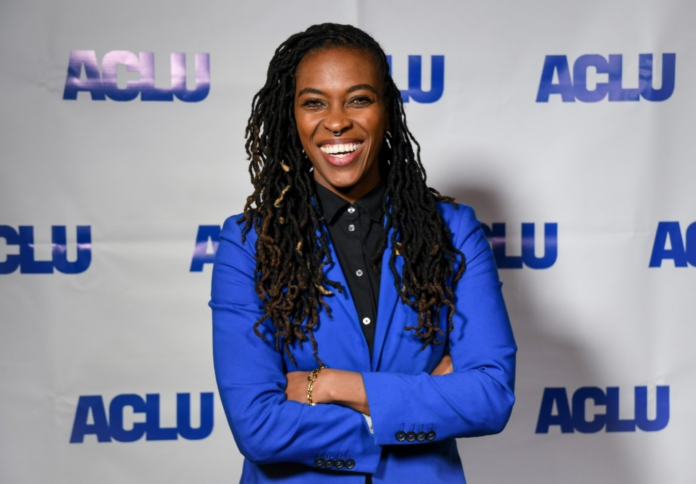
A couple of weeks ago, the College invited Amber Hikes to speak in their series “From the Ashes of Relentless Racial Crises: Creating a New United States of America.” Hikes, the deputy executive director of culture and strategy at the American Civil Liberties Union (ACLU), spoke about being an effective ally in an age of relentless opposition.
They started their talk by sharing about their morning. Earlier that day, they had been in front of the United States Supreme Court protesting a case that the court was hearing on access to abortion pills. When explaining their experience at the Supreme Court earlier that morning, they highlighted the importance of identity when being an ally. They quoted the national director of the ACLU, saying “This is not just the fight of our lives, it is the fight for our lives.” At a time when it seemed like many politicians were against diverse groups, Hikes explained the importance of fighting for our and others’ expression of identity. “There is no waiting for your turn for freedom,” they explained.
Hikes then transitioned to explaining three practical tips for becoming a better ally. First, they talked about how to be a better advocate. According to Hikes, being an advocate means more than just campaigning for a certain cause or position. Instead, it means working towards a brighter and better future and directing people towards that future. That is no easy task. To help direct people towards a better future, Hikes recommended that people work together. “Nothing can be accomplished alone that is better than working together,” they said. Working together can also help keep the mission focused on building a better future. “We mustn’t be so distracted by our opponent’s future that we forget to build our own,” they concluded.
Another part of becoming a better ally involves educating. To do that, Hikes said that we have to “clean our house first.” That means looking around and making sure that we are not just welcoming, but that we are bringing people in. Furthermore, that cannot be done alone. It must involve communicating with others to make sure that they feel included and can see you welcoming people in. It also means taking education beyond the classroom and into the dining room. For Hikes, to educate others we have to be willing to educate our family members first. Our family members are the ones who know us best and therefore might be willing to hear us out more. Change starts by educating those closest to us.
The last part of their talk focused on “finding your people.” For Hikes, having people around us goes further than just having people to support us. It also means having people we trust enough to tell us when we are wrong. Working for positive change is important, but we cannot forget that we too are human; we also mess up. It is vital that we surround ourselves with people who can lovingly call us out and challenge us to improve. Ultimately, we cannot be effective catalysts for change if we cannot change ourselves. According to Hikes, finding our people also allows us to show the strength of our side. By taking advantage of the opportunities around us to treat people with grace and kindness, we can show that our position is one of care and not malice.
Hikes then guided the audience through a couple of different interactive exercises. First, they handed out blank sheets of paper to everyone and had people write down an advocacy idea. After a couple of minutes, Hikes then had everyone crumple up the paper and toss it to another part of the audience. After a few minutes of throwing, they had everyone pick up a paper ball near them and open it up. Then, those who resonated with the idea were told to shout it out. Hikes used this to demonstrate that our ideas do not have to exist in a vacuum and we do not have to accomplish them by ourselves. There are others who share the same dreams and vision as we do, and we can partner with them to create effective change. They then led one more activity involving a Padlet, which is a digital discussion forum. Hikes had the audience put their motivation for being an advocate on a Padlet, and Hikes shared some of the most impactful whys. If people were comfortable, they could share the story behind their why.
Hikes ended their talk by stressing the importance of looking back and helping those who do not have the resources to advocate for themselves. “What good is our privilege if all it affords us is a birds-eye view of everyone we’ve left behind,” they concluded.
Matthew '24 is a philosophy and political thought major on the pre-law track.





















